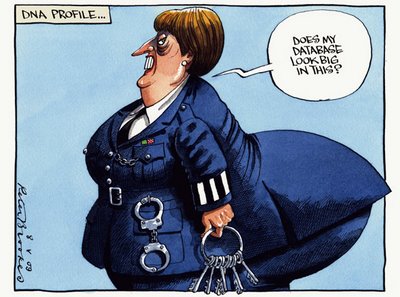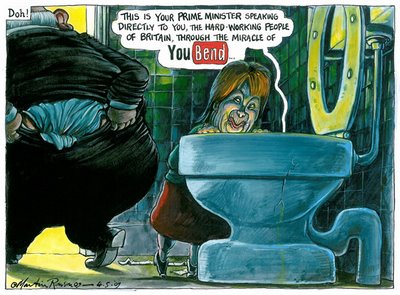 For a decision made by the European Court of Human Rights, which the tabloids habitually love to portray as a foreign entity imposing liberal madness on this unspoilt land despite our leading role in its establishment, there was surprisingly little apoplexy at the judgement concerning the retention of genetic profiles on the DNA database, especially considering the Sun had scaremongered about the case on a couple of occasions. Partly this was due to being distracted at the time, as Karen Matthews had just been convicted, but also partially down to a gradual changing of views on the general question of civil liberties. After more than a decade where the belief that if you had nothing to hide you had nothing to fear became so entrenched that almost anything, with the exception of the death penalty, was considered as a potential policy to deal with the hysteria over crime, even as crime itself fell off a cliff, sanity has finally begun to make something of a return.
For a decision made by the European Court of Human Rights, which the tabloids habitually love to portray as a foreign entity imposing liberal madness on this unspoilt land despite our leading role in its establishment, there was surprisingly little apoplexy at the judgement concerning the retention of genetic profiles on the DNA database, especially considering the Sun had scaremongered about the case on a couple of occasions. Partly this was due to being distracted at the time, as Karen Matthews had just been convicted, but also partially down to a gradual changing of views on the general question of civil liberties. After more than a decade where the belief that if you had nothing to hide you had nothing to fear became so entrenched that almost anything, with the exception of the death penalty, was considered as a potential policy to deal with the hysteria over crime, even as crime itself fell off a cliff, sanity has finally begun to make something of a return.
Sanity however is not something that comes naturally to the Home Office under Labour. Despite the hilarious complaints from the Sun, and indeed from Jack Straw that "the criminal justice lobby" have the ear of ministers more than newspaper editors do, the facts, not least a prison population which requires an early release system which actively undermines justice but without which they could not even begin to function, speak for themselves. Admittedly, the DNA database makes for an easy populist cause: while few will still openly call for a "complete" database, the idea that everyone convicted of a crime should be on it indefinitely is still a difficult position to argue against, even if it is as illogical a position as arguing for a full one. At least on one point the government does seem to be willing to be reasonable, or something approaching it: those over 10 and under 18 will have their profiles removed, regardless of whether they are convicted of a crime or not, unless for a violent or sexual offence, when they turn 18, as long as they are not arrested again during their teenage years. Youthful indiscretions it seems will not matter for life as they currently do.
If however being convicted of any offence that carries a potential prison sentence means that your profile should remain on the database indefinitely is indefensible, as the government proposes despite the ECHR's damning verdict, then the idea that those found completely innocent should remain on the database for either 6 or 12 years, depending on the gravity of the offence, is bordering on a complete mockery of justice. While everyone has become acquainted with the example of Mark Dixie, who was convicted of the murder of the photogenic Sally Anne Bowman (who we most likely would never had heard of had she looked more like Susan Boyle), after he was arrested for being involved in a minor scuffle outside a pub, it isn't really an apposite example in this instance because no one is arguing that profiles should not be created from all those arrested and checked against unsolved cases as a matter of course; he would have been caught red-handed regardless. The "consultation" document (PDF)does however contain a more troubling one for those of us who believe those found innocent of what they are accused of should instantly have their profiles removed from the database: Kensley Larrier was arrested in 2002 on suspicion of possessing an offensive weapon and had his profile taken and loaded onto the database, but no charges were brought. Three years later Larrier was successfully convicted of rape after his DNA was matched with that left at the crime scene.
It doesn't necessarily mean of course that Larrier would not have been convicted through good old fashioned police work, and the suspicions of the police confirmed once they had arrested him, but it does leave those of us advocating a complete wiping of the profiles of the innocent from the database with the uncomfortable position of knowing that undoubtedly some will get away with subsequent crimes, including the most serious, which they would otherwise have been brought to book for, or at least brought to justice for far sooner than otherwise. The key argument to make in response is that a few "bad eggs" should not mean that all those unfortunate to come under suspicion should be considered potentially guilty until proven innocent, but even that is far from being wholly convincing. Even if we then point out that no system is infallible, and that unless we are prepared to go down the previously mentioned path of everyone being on the database, some would still always escape justice, it still leaves us open to the accusation that we're prepared to put principles, however noble, before the rights of those to have justice seen to be done.
More indicative though of how the government seems determined to still eventually build such a complete database by stealth, is that all those given just a caution, a warning, or a reprimand will also have their profiles kept indefinitely. The number of cautions given in recent years has sky-rocketed, although it's not clear whether this is due to the huge rise in new offences created by this government, the fact that any offence, however minor, is now also an arrestable offence, or an increasing tendency for "summary justice" rather than court proceedings to deal with those minor offences, but it effectively means that only those officially found to be guilty of no offence whatsoever, which is also increasingly rare, will have their profiles removed.
The government claims that its proposals will not just mean that it will comply with the ruling in the S and Marper case, but that they will go substantially further than the requirements. Whether the court will agree may well depend on a further case being brought, but considering the time it will take for it wind its way first through our court system, where S and Marper failed in their attempts, and to the ECHR to consider again, it will doubtless be years before we find out. Certainly there needs to be a challenge, not just to the 6 and 12 years retention for those found completely innocent, but to the blanket retention of those given just a caution, let alone those convicted and given either a fine or a suspended sentence. Both the Conservatives and the Liberal Democrats talk a good game on doing the right thing, but whether the former can be trusted to keep their word, the LDs hardly likely to be in a position to put theirs into action, remains to be seen. In any event, the government has as usual done as little as it feasibly could to not be held in further contempt. It ought to be another thing for which it should be held to account, but even if the mood is slowly changing, there are few votes in giving in to those barmy Europeans.Labels: civil liberties, crime policies, DNA database, European Court of Human Rights, Home Office, Jacqui Smith, New Labour, politics



